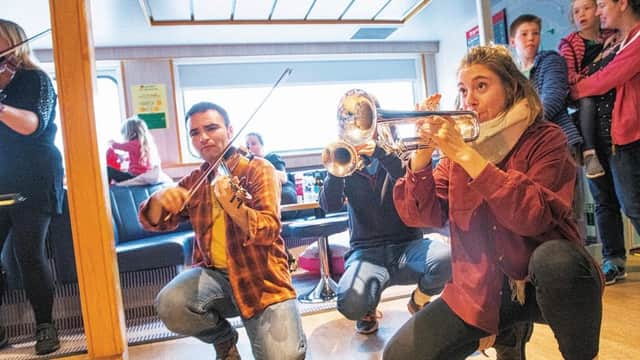How the Nevis Ensemble are bringing classical music to the people during lockdown


And for an orchestra whose ethos is all about taking live music to people who might not usually encounter it – whether that’s in care homes and schools, prisons and homeless shelters, or far-flung communities across Scotland – the current crisis has hit them harder than many. “We could sit and dwell on that,” Munn continues, “or we could see what we can do in the meantime.”
Munn is being modest: the Nevis team has taken a long, hard look at the options it still has, thought carefully about its commitment to audiences and musicians, and come up with activities entirely in line with its community-focused ethos. Co-artistic director Jon Hargreaves explains: “Obviously you immediately think: right, what should we do? But for us, it’s also been an opportunity to reflect on what we represent. If we’re basically going to be a presence on people’s screens, what can we offer?”
Advertisement
Hide AdAdvertisement
Hide AdSeveral Nevis musicians are posting solo videos online, made distinctively Nevis through their useful spoken introductions. But the group was particularly quick off the mark with its Living Room Ensemble project, which breaks down the Proclaimers’ I’m Gonna Be (500 Miles) (with the blessing of the Reid brothers) into an array of individual instrumental parts, and invites anybody to record one (or even play along on pots and pans) and send it in, all to be stitched together into a massive orchestral version. At the time of writing, submissions are about to close; by the time you read this, the result will no doubt be on Nevis’s website and social media, with a similar project planned for the near future.
“It’s not about creating a perfect video of the song,” explains Munn. “It’s more about getting people at home to do something, to practise or play. We’ve had a load of weird and wonderful submissions, and lots from kids – several from an amateur orchestra society in Cork, some from a family in Western Australia, from Kenya, the USA, all over.”
“We tried really hard to make it a project where, for example, if you were a parent or care-giver at home with three rambunctious kids, you could tell them: right, you have an hour to do this, and at the end I’ll film you,” says Hargreaves’ co-artistic director Holly Mathieson. “Even if you can’t read music or play an instrument, you can still get involved.”
Coming to a close today is a second project that builds on some of Nevis’s existing plans. Musical Postcards draws on Scotland’s Year of Coasts and Waters 2020 to commission composers to write short solo works inspired by sea- and shore-themed images or texts submitted online, and the project’s original plan of four composers has been expanded to six so that an additional two can be selected from online applications. “We’re trying to think of projects where it’s more than just exhibiting a performance online,” says Hargreaves. “What use is it to someone? With the Musical Postcards, it’s about giving people a chance to connect, through memories of a particular place perhaps, or through images or stories.”
What do they think the lasting impact of these activities might be? “At the start it felt like everyone was suddenly thinking: we’ve got to get stuff online!” says Hargreaves. “But it goes a lot deeper than that. The shutdown is a big challenge for classical music, because the art form is so product-based, whether that’s a concert or a recording. But so much of what’s online is about the making process. And to my mind, that’s a positive thing: now classical music organisations can show much more of their process, and not be embarrassed about it. It’s nice to know these musicians we see are just ordinary people like the rest of us.”
For Mathieson, it’s a case of restrictions encouraging even greater ingenuity. “For those of us who do have the means, or the connections with others, the barriers and the problems we currently have are the very things that can help us to be more creative.”
www.nevisensemble.org